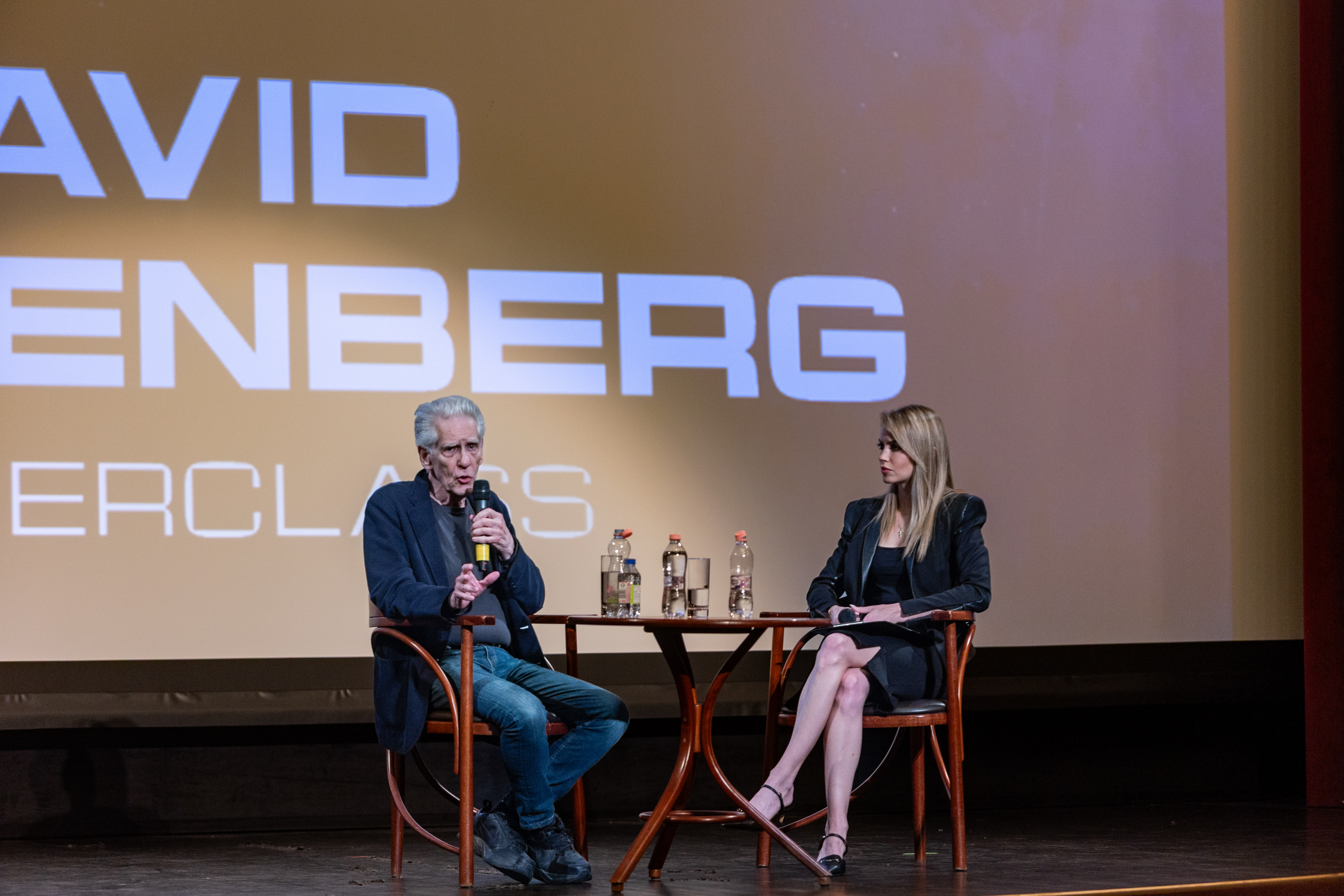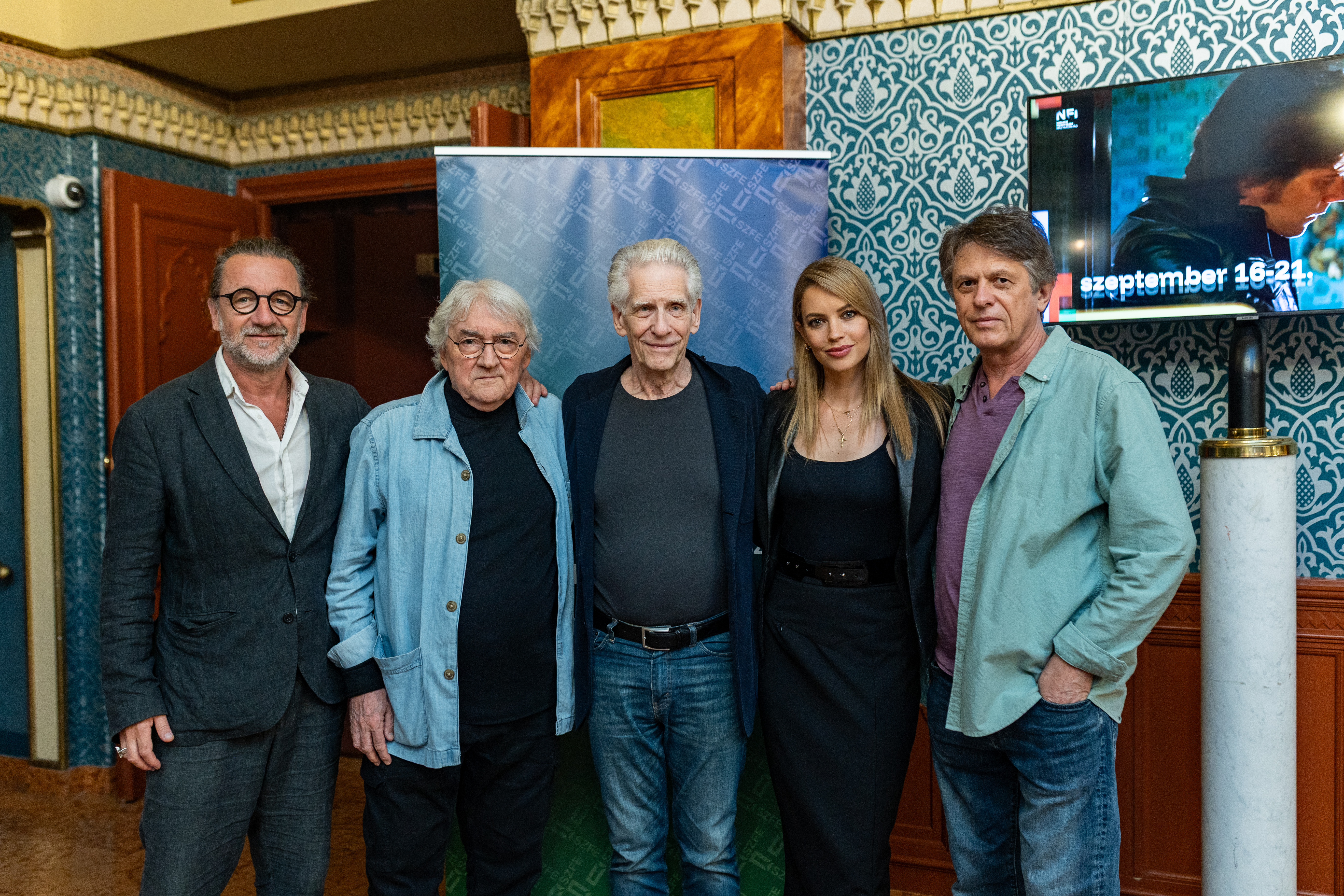David Cronenberg, the world-renowned Canadian director of the body-horror genre, visited the Uránia National Film Theatre as the guest of honor of the Budapest Classic Film Marathon. At the audience Q&A organized by the NFI and SZFE, viewers heard not only about the beginnings of his career and behind-the-scenes stories from his legendary films, but also about what technology and artificial intelligence mean to him.
Cronenberg – director of The Fly, Crash, eXistenZ, and Eastern Promises – was interviewed on stage by Barbara Somossy, a recent graduate in film directing at SZFE. She asked him, among other things, why and how the human body became his central focus. Cronenberg emphasized that for him, the body is the starting point. “The body is reality,” he stated, adding that as an atheist and an existentialist, this has always been his foundation. His films, in which the body often mutates, transforms, or decomposes, are not meant to shock for shock’s sake, but to explore the fundamental questions of existence.

David Cronenberg and Barbara Somossy
Throughout the discussion, he repeatedly returned to the idea that casting is one of the most important decisions in filmmaking. “If you choose the wrong actor, it can ruin the film,” he said. He mentioned Jeff Goldblum as an example: while others were concerned that heavy prosthetics might hide his facial expressions, Goldblum nevertheless accepted the lead role in The Fly. The director also spoke at length about his collaboration with Viggo Mortensen, with whom he worked on four films and whom he called “a special colleague, a poet, a musician, and a true artist.”
Speaking of the beginnings of his career, Cronenberg revealed that he had originally intended to become a writer, just like his father. Although he was also interested in biochemistry, it was literature and European cinema – Fellini, Bergman, Godard – that eventually drew him toward film. Describing his creative method, he explained that once he begins to write, the characters take on a life of their own and often “resist” the author. “You know you’re doing well when the characters start talking for themselves,” he said with a smile. Reflecting on the practicalities of starting out, he added with irony: “I was really Machiavellian” – meaning that, at times, survival within the system required a touch of cunning.

From left to right: Attila Csáky, Lajos Koltai, David Cronenberg, Barbara Somossy, József Pacskovszky
When asked about technology, Cronenberg stated that he does not feel nostalgic for analog filmmaking. He values the freedom of the digital era far more, which he considers an enormous opportunity for young filmmakers – since even a smartphone can be used to make a professional film. “Technology is us,” he declared, stressing that artificial intelligence should not be seen as an enemy but as a new tool in the creative process.
Naturally, the conversation also touched on his iconic films, including Crash, which caused a scandal in Cannes, though a younger audience in Venice reacted with far less outrage. Regarding this, Cronenberg emphasized that cinema has no eternal boundaries, since the norms of society are constantly shifting.
Audience members also had the chance to ask questions, to which Cronenberg responded cheerfully and often with humor. He even shared, with self-irony, that he himself now lives in “a body altered by surgical interventions and implants.”
By the end of the discussion, it became clear that Cronenberg is not only the master of body horror but also a deeply thoughtful, sensitive, and remarkably modest artist who consistently uses film to explore the essential questions of human existence. For the Budapest audience, his presence was a lasting experience – at once nostalgic and forward-looking – leaving everyone with the wish to meet him again, whether on the screen or in person, should he indeed bring his next film to Budapest.
The director was also caught for a brief interview at Uránia, which you can watch by clicking on the video below:
Other News
The First Half-Century of the Théâtre du Soleil and Two Special Guests – Book Launch in the SZFE Books Series
The SZFE Books series is once again enriched with a significant volume. Its mission is to make essential theatrical and film works available in Hungarian, works that are indispensable to contemporary artistic discourse. The newest addition is French theatre historian Béatrice Picon-Vallin’s book: Théâtre du Soleil – The First Half-Century of Ariane Mnouchkine’s Sun Theatre. The launch will take place on September 29 at the Doctoral School of SZFE.
Romeo and Juliet in the Rain – the Sopron International Theatre Workshop has concluded
In 2025, the University of Sopron once again hosted the International Theatre Workshop. On the closing day, July 8, the students presented the short stage performances inspired by Shakespeare’s Romeo and Juliet that they had been working on during the week at six different locations in the university’s botanical garden.
International Theatre Workshop Launched in Sopron - Young Artists from Six Countries Collaborate in a Weeklong Creative Residency
The University of Theatre and Film Arts Budapest (SZFE), in collaboration with the National Theatre of Hungary and the University of Sopron, proudly presents the second edition of the International Theatre Workshop – Sopron 2025, taking place from 1 to 9 July on the picturesque campus of the University of Sopron. The initiative gathers jung actors and directors from Hungary and abroad, alongside distinguished educators and theatre professionals, for a week of intensive artistic collaboration. The official opening ceremony was held on 2 July at the Ligneum Event House.
Students of SZFE at the Cannes Film Festival
The Cannes Film Festival is the world’s most famous and prestigious film festival, held every year in the second half of May in Cannes. The main venue for the screening of films competing for the Palme d’Or, the festival’s top prize, is the Festival and Congress Palace (Palais des Festivals et des Congrès) on the Croisette. This year, 25 students from the SZFE traveled to the festival; we spoke with two of them, first-year television production student Kata Hegedüs and second-year student Eszter Simon, about their experiences.
The stage awaits! – new masterclasses at the SZFE
The University of Theatre and Film Arts will launch three 12-week masterclasses in February 2025: movement, voice training and a combined movement-voice training masterclass. The training coordinator for the movement masterclass is Vidáné Szent-Ivány Kinga, associate professor and winner of the Gyula Harangozó Prize, while the voice training coordinator is Borbála Keszei, assistant professor and winner of the Liszt Ferenc Prize.
Budapest among the best student cities in Europe
Based on a survey by The Campus Advisor, Daily News Hungary published the European university ranking, in which Budapest ranked 4th. The analysis is based over 17,000 authentic ratings by students and reflecting the real experiences of those with first hand knowledge.
Unique concepts - King Lear as a film or a stage play unique concepts
On a fortuitous day, December 13th, all eight of our Erasmus students presented their examination projects from their product design course under the guidance of Professor Éva Szendrényi. The focal point of their project work was the adaptation of the first scene of King Lear, either as a film or a stage play, applying the students’ unique concepts. The adaptations ranged from contemporary themes – a drag queen show, a modern USA Wall Street business narrative – to a fantasy tale. The presentations combined freehand drawings and photos. It was fascinating to observe how the students conveyed the characters’ features and dynamics through costumes, exploring how textures and colours could represent the nuances of the characters’ roles and the social distances within the narrative. Each presentation showed how the space, costumes, colours, and lighting design work in a play or film, expressing our students’ creativity and skills.
Money-making has always been a part of Art
Prof. Paulo Leite teaches at Instituto Politécnico de Lisboa in Portugal – He specialises in screenwriting and production and has long been involved in screenwriting and film finance and film marketing in the UK. We asked him about his experiences and views during his Erasmus exchange at SZFE.
